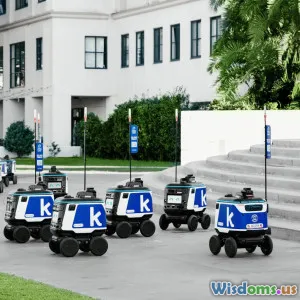
Future Skills: Preparing for an Automated World
5 min read Explore essential skills needed to thrive in an automated future shaped by AI and technology. (0 Reviews)
Future Skills: Preparing for an Automated World
In the rapidly evolving landscape of work, artificial intelligence (AI) and automation are transforming how we approach our jobs and careers. The rise of these technologies brings both challenges and opportunities, necessitating a shift in the skills employees need to thrive. This article explores the essential skills required to navigate an automated future, highlighting the importance of adaptability, critical thinking, emotional intelligence, and technical proficiency.
The Impact of AI and Automation
AI and automation are already reshaping various industries, from manufacturing to healthcare. According to a report by McKinsey, up to 375 million workers globally may need to change occupations due to automation by 2030. This shift will not only affect low-skilled jobs but also impact mid-level positions across many sectors. Therefore, the urgency to develop future skills has never been greater.
1. Adaptability
In an age where change is the only constant, adaptability is a crucial skill. Employees must be willing to embrace new technologies and methodologies. This means being open to continuous learning and reskilling. For instance, companies like Amazon and Google offer training programs to help their employees learn new skills related to AI and machine learning. Being adaptable allows individuals to pivot quickly in response to changes in their jobs or industries, making them invaluable assets to their organizations.
2. Critical Thinking and Problem Solving
Automation may handle repetitive tasks, but critical thinking and problem-solving skills are uniquely human traits that machines cannot replicate. Employees will need to analyze complex situations, make informed decisions, and solve problems creatively. This skill set is particularly important in fields like healthcare, where professionals must evaluate patient responses and adapt treatment plans accordingly. Encouraging a culture of critical thinking in the workplace can foster innovation and improve overall job performance.
3. Emotional Intelligence (EI)
As AI takes over technical tasks, the human aspects of work become more significant. Emotional intelligence, or the ability to understand and manage one’s own emotions while empathizing with others, is becoming increasingly vital. Roles that require collaboration, negotiation, and leadership will benefit from high EI. For example, customer service positions now value emotional intelligence as it contributes to better understanding customer needs and enhancing their experiences.
4. Technical Proficiency
While soft skills are essential, technical proficiency cannot be overlooked. Familiarity with AI tools, data analysis, and programming languages will give employees a competitive edge. Upskilling in these areas can lead to better job prospects and career advancement. Online platforms like Coursera and Udacity offer courses in data analytics, machine learning, and programming, making it easier than ever to acquire these skills.
5. Lifelong Learning
The concept of lifelong learning is crucial in an automated world. As technologies evolve, so too must our skills. Companies and educational institutions need to prioritize ongoing education and training opportunities to ensure that the workforce remains relevant. By fostering a culture of learning, organizations can help employees stay ahead of the curve and adapt to new developments in their fields.
Conclusion
Preparing for an automated world is not just about learning new tools and technologies; it’s about developing a versatile skill set that combines technical know-how with human-centric abilities. As we move forward, individuals and organizations must invest in adaptability, critical thinking, emotional intelligence, and technical proficiency. Embracing these future skills will not only enhance career prospects but also contribute to a more innovative and resilient workforce.
In this automated age, the ability to learn and adapt will define success. By prioritizing these skills, we can navigate the challenges posed by AI and automation, ensuring a brighter future for all.
Rate the Post
User Reviews
Popular Posts





















